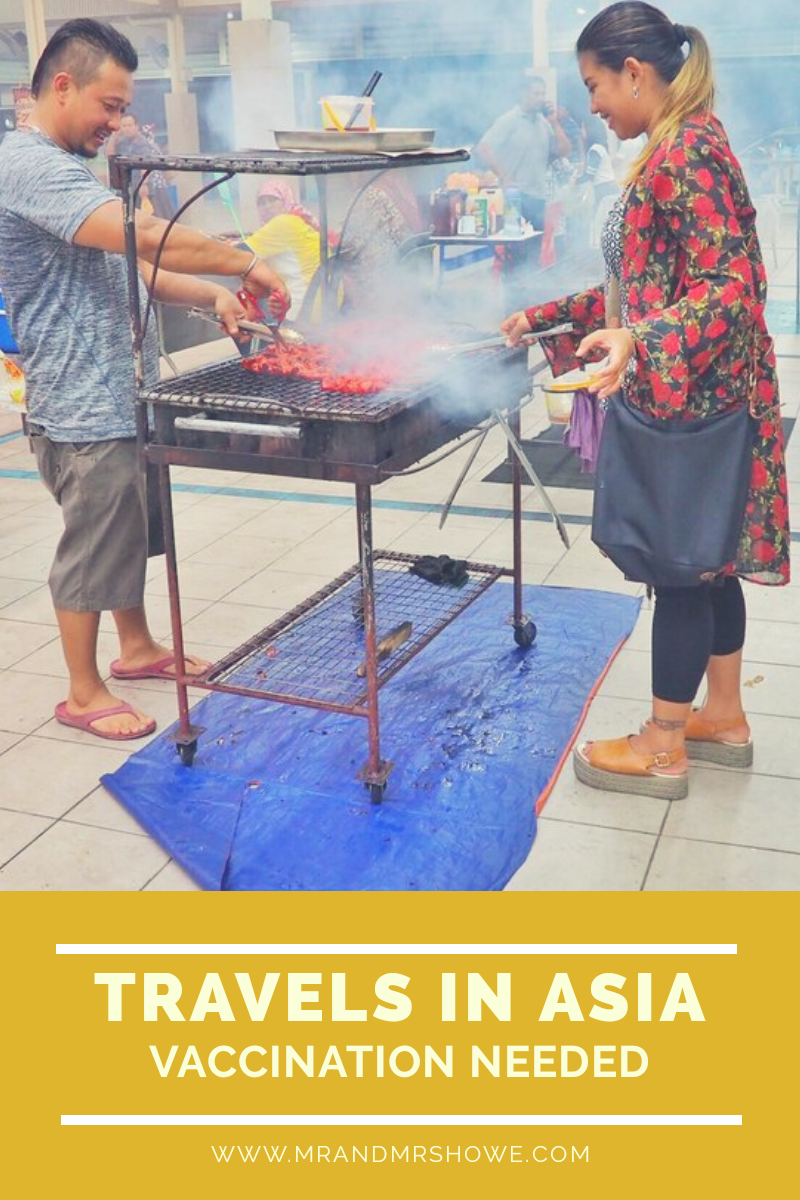Vaccination Needed for Travels in Asia - Required Vaccines Before Your Asian Trip
When traveling, especially long term, our health and safety should be our priority. We need to have resistance against viruses and bacterias that could disable us or are deadly. Good thing that there are vaccinations, with it we can relax while traveling knowing that something is protecting us from illness. With the recent Corona Virus Outbreak, you need to be more vigilant.
Asia is a big continent, and whether you are going to advanced East Asia or exotic South East Asia, you need to have vaccinations. East Asia has ticks while other parts of Asia may have Cholera or Typhoid. So it’s better to be protected against diseases then regret it later. So here are the vaccinations needed for travels in Asia:
Routine vaccinations for international travel and health as per World Health Organizations:
Diphtheria
Hepatitis B
Haemophilus Influenzae type b
Human papillomavirus
Seasonal influenza
Measles
Mumps
Pertussis
Rubella
Pneumococcal disease
Poliomyelitis (Polio)
Rotavirus
Tuberculosis (TB)
Tetanus
Varicella
The following are additional vaccinations recommended for Asia:
Cholera
Hepatitis A
Japanese encephalitis
Meningococcal meningitis
Rabies
Tick-borne encephalitis
Typhoid
Yellow Fever
In case you want to know more, here is the explanation for those vaccinations:
Cholera
How it spreads: Infected food or water
Recommended for Travel to South and Southeast Asia and the Middle East
Cholera is caused by a toxic bacteria that multiply in the small intestine resulting in intense vomiting, watery poop leading to dehydration and if not cured immediately death.
Hepatitis A
How it spreads: Contaminated food or water
Recommended for travel in Asia
Hepatitis A is from a virus infecting liver cells and causes its inflammation. Its symptoms are like flu however those who have Hep A have dark yellow urine, and jaundice (skin and the white of eyes become yellowish.)
Japanese encephalitis
How it spreads: Mosquito Bite
Recommended if:
* staying at a country on rainy season for more than a month
* go to rural areas with rice fields or marshlands
* do activities such as cycling or camping
JE Virus can cause inflammation of the brain resulting in brain damage or death. It can affect humans and animals.
Meningococcal meningitis
How it spreads: Coughing, Sneezing or Kissing
For Hajj or Umrah pilgrimages, all travelers to Saudi Arabia are needed to show evidence of vaccination. You are advised to be vaccinated if you are traveling for a long time and have close contact with the locals
The bacteria can spread from the bloodstream to the brain and can lead to paralysis, stroke, or death.
Rabies
How it spreads: Bite or Scratch from infected animals
Recommended for most long-term or animal-contact travelers
Rabies virus invades the nervous system of mammals; it transfers from an animal’s saliva. Rabies usually comes from dogs, so be very careful in petting random dogs in the streets. A dog may have rabies if it bites without being provoked, running for no reason or excessive salivation or foaming of the mouth. If a person bit has pain and itching in the wound, hyperactivity, sensitivity to noise, and fear of water, he/she might have rabies.
Note: Even if vaccinated by rabies, a person needs another shot if the bite resulted in bleeding and the animal that bit the person is dead, displays rabid behavior or is positive of rabies. If the dog is vaccinated, another shot is not needed.
Tick-borne encephalitis
How it spreads: Tick Bites or Consumption of dairy products from an infected animal
Recommended for anyone planning to live or work in a high-risk region, or late spring or summer hiking and camping. The ticks that cause TBE can be detected in eastern Russia and some East Asian nations, including some Chinese and Japanese territories.
TBE can cause malfunctions primarily the central nervous system and can cause seizures, paralysis, or brain damage.
Typhoid
How it spreads: Contaminated food or water
Recommended if you have prolonged exposure to places where there is poor sanitation or food hygiene or if you are staying or working with locals in the following areas:
Middle East
South Asia
Southeast Asia
Typhoid is caused by Salmonella typhi. This bacteria makes the person have a fever, headaches, vomiting, abdominal pains and loss of appetite. It can be deadly if not treated immediately.
Yellow Fever
How it spreads: Infected Mosquito Bite
A mosquito becomes infected when they bite an infected human or monkey and infects another person by biting him/her. It is a big step above normal fever because it also causes internal bleeding, shock, organ failure, and death.
Here is the recommendation per country according to the World Health Organization:
The following are regarded as countries and areas with risk of yellow fever transmission:
Africa: Angola, Benin, Burkina Faso, Burundi, Cameroon, Central African Republic, Chad, Congo, Côte dʼIvoire, Democratic Republic of the Congo, Equatorial Guinea, Ethiopia, Gabon, Gambia, Ghana, Guinea, Guinea-Bissau, Kenya, Liberia, Mali, Mauritania, Niger, Nigeria, Rwanda, Senegal, Sierra Leone, Sudan, South Sudan, Togo and Uganda.
America: Argentina, Bolivia, Brazil, Colombia, Ecuador, French Guiana, Guyana, Suriname, Trinidad (Trinidad only), Panama, Paraguay, Peru and Venezuela (Bolivarian Republic of).
As for routine vaccines, here are the explanations:
Diphtheria
How it spreads: infected wound or person-to-person contact
The bacteria lives in mouth, throat, and nose and produces a potent toxin that kills cells.
Hepatitis B
How it spreads: open sores, contact with blood or exchange body fluids (Sex, needles, etc.) with someone infected
HepB causes an infection of your liver that can scar organs, liver failure, or cancer.
Haemophilus Influenzae type B
How it spreads: Airborne
This also triggers possibly serious inflammatory infections of the face, mouth, blood, joints, heart, bones, peritoneum, and trachea as opposed to regular influenza
Human papillomavirus
How it spreads: enter through wounds, Skin to skin contact, Sex
The most common sexually transmitted infection, it can cause genital wart or cervical cancer
Seasonal influenza
How it spreads: Airborne
Acute respiratory infection
Measles
How it spreads: breathing in measles virus
This contagious respiratory disease can cause a rash and fever.
Mumps
How it spreads: Saliva or sharing utensils
Mumps causes inflammation of salivary glands. A person may have puffy cheeks and a tender, swollen jaw.
Pertussis
How it spreads: Airborne
Whooping cough creates uncontrollable, violent coughing, often making breathing difficult
Rubella
How it spreads: Cough or sneeze from an infected person
Milder than measles; however, if a pregnant woman has German measles, it can cause severe birth defects.
Pneumococcal disease
How it spreads: Cough or sneeze from an infected person
It can cause a middle ear infection, a blood infection, pneumonia, or bacterial meningitis.
Poliomyelitis (Polio)
How it spreads: Contaminated food or water
The virus travels to the brain and spinal cord of an infected person and may trigger paralysis.
You need a boost against polio, particularly if you are going to Pakistan or Afghanistan.
Rotavirus
How it spreads: Contaminated food or water
Common with babies, it can cause diarrhea leading to dehydration.
Tuberculosis (TB)
How it spreads: Cough or sneeze from an infected person
The bacteria usually attack the lungs; TB is slow though and might not be known in an early stage.
Make sure you are vaccinated if you are traveling to
Middle East
South Asia
Southeast Asia
Tetanus
How it spreads: Wound
Commonly known as lockjaw, this is a disease that impacts your nervous system, resulting in painful muscle contractions, especially of the muscle of your jaw and neck.
Varicella
How it spreads: Direct Contact or Airborne
Chickenpox is a communicable disease with small, fluid-filled blisters that can cause an itchy rash.
CORONAVIRUS
Photo by World Health Organization
With the recent outbreak of Coronavirus Disease (COVID-19), here are basic protective measures against it by the World Health Organization. No one in Africa has been infected, but it’s better to be safe than sorry.
Wash your hands frequently (use soap and water or alcohol-based hand rub)
Maintain at least 1 meter between yourself and someone who is coughing or sneezing
Don’t touch your eyes, nose, or mouth as they are places where the virus can enter your body
Manners – cover your mouth or nose when you cough or sneeze
If you have a cough, fever, or difficulty in breathing – go to a doctor
Stay informed
Preventing diseases is better than curing them. It is better to spend more than $500 in injections rather than pay hospital bills, feel dreadful, and staying in bed instead of exploring the world. A lot has been vaccinated as a kid but make sure to ask your doctors if you need boosters especially if you are traveling to a high-risk country. Getting pricked for a few short times is better than being infected by those deadly viruses or bacteria.
Our health is important; we couldn’t travel if we are not fit. So suck it up (the pain and the bills) for a few minutes, get that vaccination and enjoy wandering Asia. Happy Travels!
Are you on Pinterest? Pin these!














![Travel Guide to Sarajevo, Bosnia and Herzegovina [with Sample Itinerary]](https://images.squarespace-cdn.com/content/v1/5806a87f6a4963c2ddce112c/862dad96-56d7-4e16-8321-6b74b78c488c/Travel+Guide+to+Sarajevo%2C+Bosnia+and+Herzegovina+%5Bwith+Sample+Itinerary%5D1.jpg)

